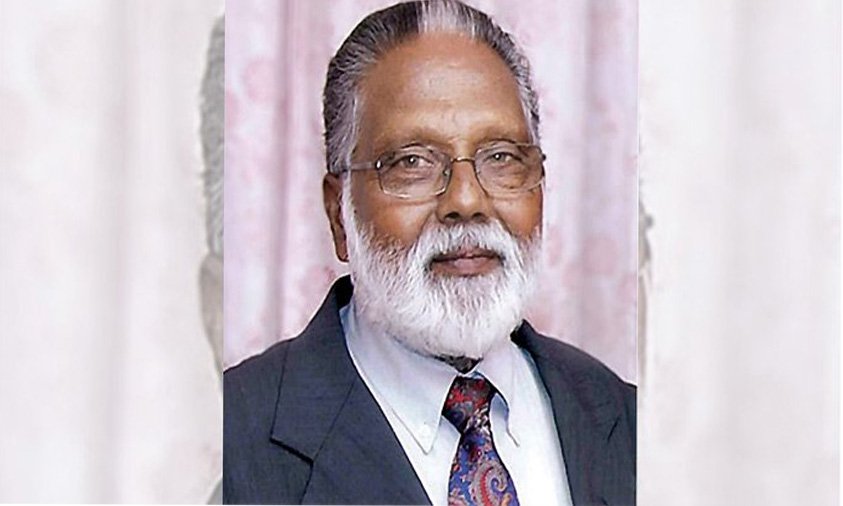Philanthropist George Joseph Fernandez passed away early morning after a short battle with respiratory distress and pneumonia in a private hospital here on Sunday morning. He was 94. He is survived by his wife Celine, his six children – sons George, Cedric and Alfred and daughters Alphonsa, Antoinette and Susan; 13 grandchildren and 8 great- grandchildren.
As per his last wishes, GJ Fernandez will be buried in his native family grave at Kureepuzha of Kollam District in Kerala.
His mortal remains will be kept at his house in Secunderabad for those who would like to pay their last respects, but in view of the CoVid-19 pandemic protocol, viewing will be restricted to Monday four hours – between 10 am and 12 noon and 4 pm to 6 pm only, according to his family members.
GJ Fernandez was considered to be a pioneer and an architect of Modern India, one of South India’s finest Class -1 contractors engaged in the construction of dams, canals, roadways and power stations. Born in 1926 into a humble Catholic family in Kureepuzha, Kollam, he lived through the struggles of World War II, repeated famines and epidemics. With times being tough, he left his village at the young age of 17 with a high school certificate and a few rupees in his pocket to join the British Indian Army at Secunderabad Cantonment. He made a name for himself with his hard work and efficiency.
In 1947, GJF left the army and joined the Tungabhadra Dam project at Muneerabad in a clerical position. Within a year, he had started his first business as a building material supplier. In just under 5 years, GJF catapulted into the major league of contractors from Class-IV to Class-I. He came to be known as the Contractors’ contractor for his innovative ideas and timely execution of contracts. His first major construction involved large portions of the TB Masonry Dam in Hospet, erstwhile Hyderabad State.
He was recognized as the Man with the Midas touch. Over the years, he went on to build a business empire, with a diversified portfolio of projects that included Irrigation, Dam and canal projects at the Tungabhadra, Upper Krishna, Kinnersani, Kothagudam, Karanja, Donkarayi, Gulbarga Irrigation and Bhima Lift Irrigation Scheme at Afzalpur. GJF made the transition from Irrigation to Power sector. He executed the mammoth thermal power projects at Kothagudam, Raichur, Rayalseema and Vijayawada. His ever-expanding portfolio included major road works in Karnataka and administrative commissions like the Mini Vidhan Soudha at Gulbarga, the Mini-Note Press (RBI) at Mysore, DRDO Sports Complex at Hyderabad, Sugar factory at Bidadi amongst several other prestigious contracts.
In 1968, the construction magnate diversified into marine exports. He established the Esmario seafood factory at Mukkad, now a E.U certified company, on land abutting the Ashtamudi back waters near the mouth to the sea at Kollam. He dredged a canal that resulted in fortifying two islands and benefitted the fishing community. Within eighteen months of commencing the factory, he had bagged the National Award for Outstanding Export Performance for the year 1969-70. He also won MPEDA awards for the year 2009, 2011 & 2012 for Southern Region.
The industrialist, drawing synergy from his marine food processing and exports diversified into mechanisation of fishing crafts securing distribution of US based Mercury and Mariner OBMs, Cummins Mercuriser Diesel & Yanmar Marine engines besides Sillinger (France), the Australian company Aircraft Hovercraft, Chaparral Boats, USA, Kohler Marine, Castoldi Water Jets of Italy. The remarkable performance of Esmario was rewarded with the Rainpa International Outstanding Performance by U.S.A in 1990 and several other awards for their services.
Nearly all India’s defence, recreation and trade related supplies for marine propulsion systems and services were arranged by the company with their key collaborators. In the 1980’s he established a factory at Bommasandra in Bangalore manufacturing and supplying LP Gas Cylinders of various capacities to the public sector oil companies – IOCL, BPCL and HPCL besides supplies to the private sector.
Ferandez’ philanthropic Charitable Trusts at Secunderabad and Kureepuzha have built educational institutions – Sacred Heart Schools in Secunderabad and Kureepuzha, Auditoriums, Rural Health Centre, Vocational Training and youth centres. The Trust has been involved in building and renovating several churches and places of worship for different faiths across the country.
His personal acts of philanthropy happened in the era much before CSR became a catch- phrase. Nobody who reached out to him for help went away empty-handed; whether it was the rehabilitation of fishermen families affected by the 2005 Tsunami, family pensions for villagers, bus shelters on highways, temples and mosques in remote locations, women empowerment initiatives or healthcare centres. He built chapels and churches dedicated to his beacons of faith – Mother Mary, St. Joseph, St. Alphonsa and St. Theresa of Calcutta and sponsored feasts for devotees on holy days. He believed that he had been blessed with grace and considered it important to share his good fortune with the needy.
GJF was a family man and loyal friend who cherished the people who entered his life. When the CoVid pandemic began, GJF was kept protected in home quarantine, even from the near and dear, for fear of infection. On May 20, on his 94th birthday, his family came together to wish him on a video conference call from across the globe. Unexpectedly, two days later, under a medical emergency, he was rushed to Yashoda Hospital where he was treated for respiratory distress and pneumonia and breathed his last at 6 am on 31 st May 2020.
Every generation has a legend. GJ Fernandez stood out among his peers as a visionary and a champion of his faith. He will always be remembered for his kindness and good deeds and for his emphasis on grabbing every moment as an opportunity for joy or learning.
